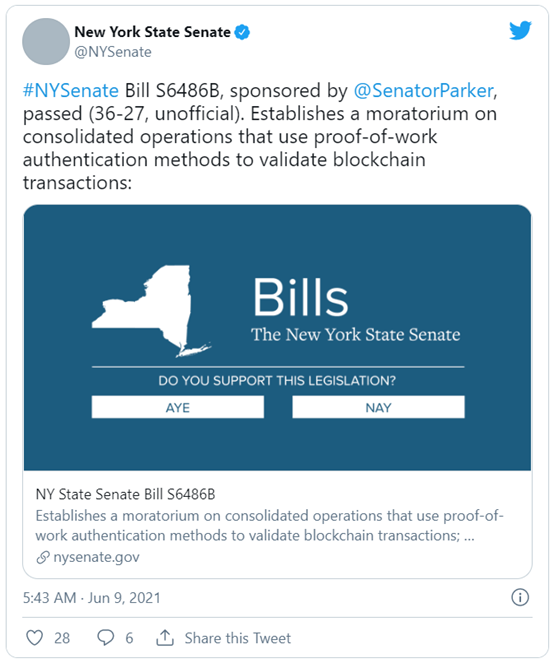A cryptocurrency mining ban that called for a mandatory three-year suspension of all mining operations in New York has been watered down, and environmentally friendly projects will now be allowed.
The bill passed the Senate on June 8 and has now been brought to the state legislature. If the bill passes Congress, it will go to Governor Andrew Cuomo to approve or veto the proposed legislation.
The original New York Senate Bill 6486A seeks to halt all crypto mining within three years to allow for environmental impact reviews of mining operations in the tri-state area.
However, the bill was amended in the Senate to allow it to pass, and the revised Bill 6486B now only focuses on any company that uses a carbon-based fuel source to power proof-of-work crypto mining.
New York State Senate (@NYSenate) tweeted on June 9, 2021: #NYSenate Bill S6486B, sponsored by @SenatorParker, passed (36-27, unofficial). Suspend merge operations that use proof-of-work authentication methods to validate blockchain transactions.
There is no longer a specific time frame for the mining ban, and the bill prohibits the expansion of any mining operations powered by carbon fuels, as well as the establishment of any new mining operations using non-renewable energy sources.
The revised bill also requires documentation on the energy output, carbon footprint and type of fuel used by all crypto miners.
Governor Cuomo said on June 7 that he was not familiar with the proposed ban, however, he was aware of the environmental concerns surrounding the crypto mining industry: "There are serious concerns, no doubt, there are serious concerns. I'll look at the legislation."
"There are serious concerns, no doubt, there are serious concerns. I'll look at the legislation."
New York lawmakers’ scrutiny of crypto mining appears to be related to its sustainable energy goals, with the bill referring to the state’s Climate Leadership and Community Protection Act
The Conservation Act sets a goal of reducing greenhouse gas emissions by 85% by 2050 and achieving net zero emissions across all sectors of the economy within that timeframe.

An ongoing question that concerns some New York residents is the approved expansion of Greenidge’s gas-fired bitcoin factory on Seneca Lake — which intends to dedicate 85 megawatts of power to bitcoin mining by 2022.
The company's reported transition from coal to natural gas, and more recently to carbon neutrality through carbon offsets, has not dampened opposition from environmental group Seneca Lake Guardian.
 On June 5, the group pointed out that Greenidge had only been converted from a coal-fired power plant to a "frac gas-fired plant," and complained that the Department of Environmental Conservation (DEC) had failed citizens' expectations by not "finalizing a new plan."
On June 5, the group pointed out that Greenidge had only been converted from a coal-fired power plant to a "frac gas-fired plant," and complained that the Department of Environmental Conservation (DEC) had failed citizens' expectations by not "finalizing a new plan."
"Greenidge is now burning fossil fuels just to make money on climate change, without any regulation or oversight."
If 10 years ago we faced a major challenge in utilizing alternative energy sources, now, considering the development of Bitcoin, the challenge is even more serious.
Currently, a small mining farm of multiple mining machines has to solve trillions of puzzles every second to discover one block per month. Considering that the difficulty level of these problems increases every 2016 blocks, or every two weeks, this means that the energy and cost required for mining will become larger and larger.